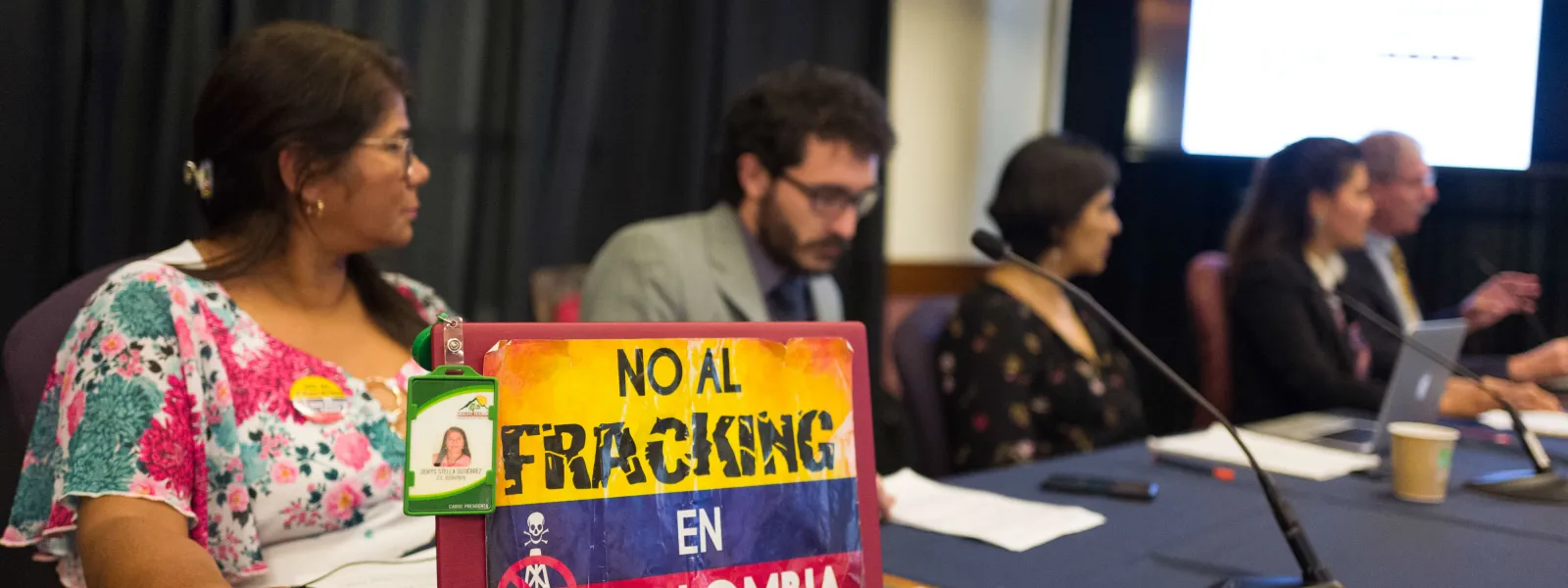
Civil society warns Inter-American Commission of human rights violations caused by fracking in Latin America
Photo: IACHR (CC BY 2.0).Boulder, Colorado. Representatives of communities and organizations from across Latin America testified before the Inter-American Commission on Human Rights this week on the impacts that hydraulic fracturing (fracking) has on human rights and the environment.
The hearing—responding to a petition signed by more than 126 organizations from 11 countries of the Americas—was held in Boulder, Colorado this week as part of the Commission’s 169th period of sessions.
The principal requests to the Commission, and the Rapporteurs from various countries, were to urge the States to adopt efficient and opportune measures to prevent human rights violations resulting from the exploration and exploitation of hydrocarbons, and to apply the precautionary principal in the face of fracking’s environmental damages.
“In Latin America, fracking been carried out without informing or adequately consulting the affected populations, thereby violating their right to information, participation, prior consultation and consent,” explained Liliana Ávila, Senior Attorney with the Interamerican Association for Environmental Defense (AIDA). “Fracking’s demand for water competes with the use of water for human consumption, and the contamination it causes in the water, soil and air seriously impacts the right to a healthy environment and compromises the effective enjoyment of other rights—including a dignified life, personal integrity, health, food, water and adequate housing.”
At the hearing, it was emphasized that women disproportionately suffer the impacts of fracking due to potential harm to their reproductive health, and since women are traditionally responsible for collecting water for use in their homes.
Referring to the experience of the Mapuche communities of Argentina, Santiago Cané of the Environment and Natural Resources Foundation (FARN) stressed, “Fracking produces acts of violence against those who defend the environment and their rights.”
“Institutionally, we can talk about the criminalization of social protest as one form of intimidation to eliminate the resistance to fracking projects,” he explained. “The prosecution of criminal cases against communities leaders that oppose the development of fracking has become an institutional media campaign that seeks to promote the idea that Mapuche communities are part of a terrorist group.”
In Mexico, “specifically in the municipality of Papantla, Veracruz—which according to freedom of information requests is the city with the greatest number of fracking pools in the country—where the population is primarily the Totonac people, this exploitation technique has led to the diversion of springs and the drying up of artisanal wells. Many communities have lost their natural sources of water and have seen their health compromised and their living conditions deteriorate,” explained Alejandra Jiménez of the Mexican Alliance Against Fracking.
Dorys Gutiérrez, of the Colombian organization Corporation for the Defense of Water, Territory and Ecosystems, noted that: “In Europe, 18 nations have applied the precautionary principle to prohibit or restrict this practice and in Australia, four of the eight territories have bans or moratoria in place. If fracking is so beneficial, why has it been so widely rejected in so many places?”
According to data compiled by the Latin American Alliance on Fracking, roughly 5,000 fracking wells exist across the region. About 2,000 of those wells are found in Argentina; more than 3,350 are found in Mexico; and in Chile, according to official data, 182 wells have been approved, primarily for the island of Tierra del Fuego.
Despite the technique’s expansion across the region, there has also been progress in banning or imposing restrictions on fracking in three states of the United States, in Uruguay, in the Argentine province of Entre Ríos, and in more than 300 municipalities in Brazil.
Fracking’s advance is harmful to human rights, and represents a threat to the consolidation of the legal framework promoted by the Inter-American Human Rights System, which includes the obligations of States and the international protection of human rights and the environment.
